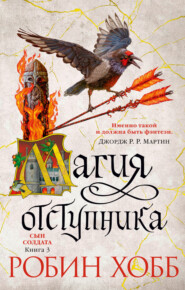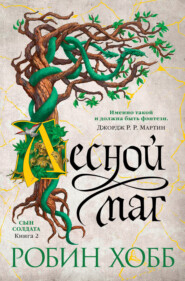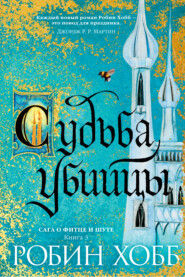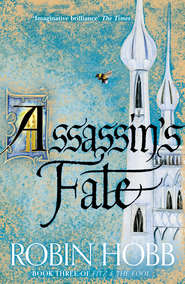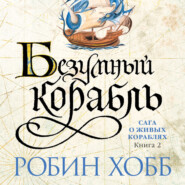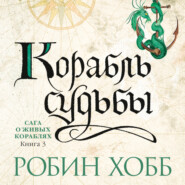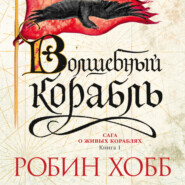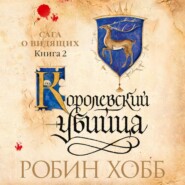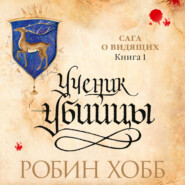По всем вопросам обращайтесь на: info@litportal.ru
(©) 2003-2024.
✖
The Rain Wild Chronicles: The Complete 4-Book Collection
Автор
Год написания книги
2018
Настройки чтения
Размер шрифта
Высота строк
Поля
Her mother was silent for a moment. ‘That is wise of you,’ she said finally, adding in a voice that was cool but still gentle, ‘I am relieved to see that you have finally stopped sulking.’
Alise could not tell if her mother was stating something she believed was true or was demanding that she accede to a dictation of deportment. She closed her eyes for an instant. Today, to the north, in the depths of the Rain Wilds, the dragons were emerging from their cases. Well, she amended to herself, today was the day appointed by Tintaglia for the leaves and debris to be swept away from them, so that the sunlight might touch them and stir them to wakefulness. Perhaps even now, as she sat at her tidy little desk in her pale room, surrounded by her tattered scrolls and feeble efforts at notes and sketching, dragons were tearing and shouldering their way out of the cocoons.
For a moment, she could imagine the whole scene: the verdant riverbank warmed by summer sunshine, the brilliantly-hued dragons trumpeting joyously as they emerged into daylight. The Rain Wild Traders were probably heralding the hatching with all sorts of festivities. She imagined a dais decorated with garlands of exotic flowers. There would be speeches of welcome to the emerging dragons, song and feasting. No doubt each dragon would parade before the dais, be joyously introduced, and then would open wide its glittering wings and lift off into the sky. These would be the first dragons to hatch in Sa knew how many years. Dragons had come back into the world … and here she was, trapped in Bingtown, shackled to a docile existence and subject to a courtship that baffled and annoyed her.
Disappointment suddenly smothered her. She had dreamed of making the trip to witness the dragons’ hatching since she had first heard of the serpents encasing themselves. Alise had begged it of her father, and when he had said it might be improper for her to travel on her own, she had flattered and bribed her younger brother’s wife until she had persuaded Alise’s younger brother to promise to accompany her. She had secretly sold off items from her hope chest to amass the passage money she needed and pretended to her parents that she had been saving from the small monthly allowance they gave her. The precious billet for the trip was still wedged in the corner of her vanity mirror. For weeks, she had seen it every day, a stiff rectangle of cream-coloured paper scribbled over with a clerk’s spidery handwriting attesting that she had paid full price for two round trips. That bit of paper had represented a promise to herself. It had meant that she would see what she had read of; she would witness an event that would, that must change the course of history. She would sketch the scene and she would write of it authoritatively, tying all she witnessed to her years of scholarly research. Then everyone would have to recognize her knowledge and ability and concede that although she might be self-educated on the matter she was certainly far more than an eccentric old maid obsessed with dragons and their Elderling companions. She was a scholar.
She would have something that belonged to her, something salvaged out of the miserable existence that life in Bingtown had become. Even before war had descended, her family’s fortune had been scraping bottom. They lived simply, in a modest manor house on the unfashionable edges of Bingtown. No grand park surrounded their home, only a humble rose garden tended by her sisters. Her father made his living by expediting trades between wealthier families. When war came and trading faltered, there was little profit for a go-between. She was, she knew, a plain, solid girl, from a plain, solid family ensconced firmly toward the lower end of the Bingtown Traders social ladder. She had never been anyone’s idea of a ‘good catch’. It had not brightened her forecast when her mother had delayed her debut into society until her eighteenth year. She’d understood the reasons: her family had been arranging and financing her older sister’s wedding. They’d had nothing to spare to launch yet another daughter. When, finally, she had been presented to Trader society three years ago, no man had raced to claim her from the butterfly mob of young girls. Three crops of Bingtown femininity had been released into the pool of eligible maidens since then, and with every passing year, her prospects of courtship and marriage had dimmed.
The war with Chalced had obscured them entirely. Her mind shied from recalling those nights of fire and smoke and screams. Chalcedean vessels had invaded the harbour and burned the warehouses and half the market square to the ground. Bingtown, the fabled and fabulous trade town where ‘if a man could imagine it, he could find it for sale’ had become a city of stinking ruins and sodden ash. If the dragon Tintaglia had not come to their aid, like as not, Alise and her entire family would be Tattooed slaves somewhere in Chalced by now. As it was, the invaders had been repelled and the Traders had formed a rough alliance with the Pirate Isles. Jamaillia, their motherland, had come to its senses and seen that Chalced was not an ally but a plundering nation of thieves. Today, Bingtown Harbour was clear of invaders, the city had begun to rebuild, and life had begun a hesitant return to routine. She knew she should have been grateful that her family’s home had escaped burning, and that their holdings, several farms that grew mostly root crops, were now producing food that was greatly in demand.
But the truth was, she wasn’t. Oh, not that she wished to be living in a half-burned hovel or sleeping in a ditch. No. But for a few frightening, exhilarating weeks, she had thought she might escape from her role as the third daughter in a lesser Bingtown family. The night Tintaglia had landed outside the burned shell of the Traders’ Concourse and struck her bargain with the Traders, offering her protection of their city in exchange for the Traders’ pledge to aid the serpents and the young dragons when they hatched, Alise’s heart had soared. She had been there. She had stood, shawl clutched about her shoulders, shivering in the dark, and listened to the dragon’s words. She had seen the great creature’s gleaming hide, her spinning eyes, and yes, she had fallen under the spell of Tintaglia’s voice and glamour. She had fallen gladly. She loved the dragon and all that she stood for. Alise could think of no higher calling than to spend the rest of her life chronicling the history of dragons and Elderlings. She would combine what she knew of their history with her recording of their glorious return to the world. In that night, in that moment, Alise had suddenly perceived she had a place and a mission in the world. In that time of flames and strife, anything had seemed possible, even that some day the dragon Tintaglia would look at her and address her directly and perhaps, even, thank her for dedicating herself to such a work.
Even in the weeks that followed, as Bingtown pieced itself back together and struggled to find a new normalcy, Alise had continued to believe that the horizons of her life had widened. The Tattooed, the freed slaves, had begun to mingle with the Three Ships Folk and with the Traders as all united to rebuild Bingtown’s economy and physical structures. People – even women – had left their usual safe orbits and pitched in, doing whatever they must to rebuild. She knew that war was a terrible, destructive thing and that she should hate it, but the war had been the only really exciting thing that had ever happened in her life.
She should have known her dreams would come to naught. As homes and businesses were rebuilt, as trade took on a new shape despite war and piracy, everyone else had tried desperately to make things go back as they were before. Everyone except Alise. Having glimpsed a possible future for herself, she had struggled wildly to escape from the suffocating destiny that sought to reclaim her.
Even when Hest Finbok had first begun to insinuate himself into her life, she had kept her focus on her dream. Her mother’s enthusiasm, her father’s quiet pride that the family’s wallflower had finally attracted not only a suitor but such a rare prize of a suitor had not distracted her from her plan. Let her mother flutter and her father beam. She knew Hest’s interest in her would come to nothing, and thus she had paid little mind to it. She was past pinning her hopes on such silly, girlish dreams.
The Traders’ Summer Ball was only two days away now. It would be the first event to be held in the newly rebuilt Traders’ Concourse. All of Bingtown was in a stir about it. Representatives and guests from the Tattooed and the Three Ships Folk would join the Bingtown Traders in commemorating the rejuvenation of their city. Despite the ongoing war, it was expected to be a celebration beyond anything Bingtown had ever experienced, the first time that the general population of Bingtown had been invited to the traditional event. Alise had given it little thought, for she had not expected to attend it. She had her ticket for her trip to the Rain Wilds. While other eligible women fluttered their fans and spun gaily on the dance floor, she would be in Cassarick, watching a new generation of dragons emerge from their cocoons.
But two weeks ago Hest Finbok had asked her father’s permission to escort her to the ball. Her father had given it. ‘And having given it, my girl, I can scarcely withdraw it! How could I imagine that you would want to go up the Rain Wild River to see some big lizards hatch rather than go to the Summer Ball on the arm of one of Bingtown’s most eligible bachelors?’ He had smiled proudly the day he had dashed her dream to pieces, so sure he had known what was truly in her heart. Her mother had said that she had never even imagined that her father should consult her on such a matter. Didn’t she trust her parents to do what was in her best interest?
If she had not been strangling on her dismay and disappointment, Alise might have given her father and her mother a response to that. Instead she had turned and fled the room. For days afterwards she had mourned the lost opportunity. Sulked, as her mother put it. It hadn’t deterred her mother from calling in seamstresses, and buying up every measure of rose silk and pink ribbon that remained in Bingtown. No expense would be spared for her dress. What did it matter that Alise’s dream had died in the egg, if they had theirs of finally marrying off their useless and eccentric second younger daughter? Even in this time of war and tightened budgets, they would spend feverishly in hopes of being not only rid of her but also gaining an important trade alliance. Alise had been sick with disappointment. Sulking, her mother called it. Was she finished with it?
Yes.
For an instant, she was surprised. Then she sighed and felt herself let go of something that she hadn’t even known she was clutching. She almost felt her spirit sink back to a level of ordinary expectations, back to accepting the quiet, restrained life of a proper Trader’s daughter who would become a Trader’s wife.
It was over, it was past, it was finished. Let it go. It wasn’t meant to be. She had turned her eyes to the window during her brief reverie. She had been staring sightlessly out at the little rose garden that was now in full blossom. It looked, she thought dully, just as it had every summer of her life. Nothing ever really changed. She forced the words out past the gravel in her throat. ‘I’m not sulking, Mother.’
‘I’m glad. For both of us.’ Her mother cleared her throat. ‘He’s a fine man, Alise. Even if he were not such a good catch, I’d still say that about him.’
‘Better than you expected for me. Better than I deserve.’
A pause of three heartbeats. Then her mother said brusquely, ‘Don’t make him wait, Alise.’ Her long skirts swished gently against the hardwood floor as she left the room.
She had not, Alise noticed, contradicted her. Alise was aware of it; her parents were aware of it, her siblings were aware of it. No one had ever spoken it aloud, until now. Hest Finbok was too good for her. It made no sense that the wealthy heir of a major Bingtown family would wish to wed the plain middle child of the Kincarron Traders. Alise felt strangely freed that her mother had not denied her words. And she was proud that she had spoken her words without resentment. A bit sad, she thought as she re-smudged her fingers by neatly restoring her charcoal to its little silver box. A bit sad that her mother had not even tried to claim she deserved such a fine man. Even if it was a lie, it seemed to her that a dutiful mother would have said it, just to be polite to her least attractive daughter.
Alise had tried to think of a way to explain her lack of interest in Hest to her mother. But she knew that if she said to her mother, ‘It’s too late. My girlhood dreams are dead, and I like the ones I have now better,’ her mother would have been horrified. But it was the truth. Like any young woman, she had once dreamed of roses and stolen kisses and a romantic suitor who would not care about the size of her dowry. Those dreams had died slowly, drowned in tears and humiliation. She had no desire to revive them.
A year past her emergence into society, with no suitors in sight, Alise had resigned herself to her fate and begun grooming herself for the role of maiden aunt. She played the harp, tatted excellent lace, was very good at puddings, and even had selected a suitably whimsical hobby. Long before Tintaglia had jolted her dreams, she’d become a student of dragon lore, with a strong secondary knowledge of Elderlings. If a scroll existed in Bingtown that dealt with either topic, Alise had found a way to read, buy or borrow it long enough to copy it. She believed she now had the most extensive library of information on the two ancient races that anyone in the town possessed, much of it painstakingly copied over in her own hand.
Along with that hard-earned knowledge, she had earned a reputation for eccentricity that not even a large dowry would have mitigated. In a middle daughter from a less affluent Trader family, it was an unforgivable flaw. She didn’t care. Her studies, begun on a whim, had seized her imagination. Her dragon knowledge was no longer an eccentric hobby; she was a scholar, a self-taught historian, collecting, organizing and comparing every scrap of information she could garner about dragons and the ancient Elderlings rumoured to have lived alongside the great beasts. So little was known of them and yet their history was woven through the ancient underground cities of the Rain Wilds and hence into the history of Bingtown. The oldest scrolls were antiquities from those cities, written in letters and a language that no one could read or speak. Many of the newer scrolls and writings were haphazard attempts at translations, and the worst ones were merely wild speculation. Those that were illustrated were often stained or tattered, or the inks and vellum had become food for vermin. One had to guess what had originally been there. But with her studies, Alise had begun to be able to do more than guess, and her careful cross referencing of surviving scrolls had yielded up to her a full score of words. She felt confident that with time, she could force all their secrets from the ancient writings. And time, she knew, was one thing an old maid had in abundance. Time to study and ponder, time to unlock all these tantalizing mysteries.
If only Hest Finbok had not stepped into her life! Five years her senior, the heir son of a Trader family that was very well to do, even by Bingtown standards, he was the answer to a dream. Unfortunately, the dream was her mother’s, not Alise’s. Her mother had near fainted with joy the first time Hest had asked Alise to dance. When, during the same evening, he had danced with her four more times, her mother had scarcely been able to contain her excitement. On the way home in the coach she had been unable to speak of anything else. ‘He is so handsome, and always so well dressed. Did you see the look on Trader Meldar’s face when Hest asked you to dance? For years, his wife has been throwing her daughters at him; I’ve heard she has asked Hest to dinner at her home as many as seven times in a month! The poor man. All know the Meldar girls are nervous as fleas. Can you imagine sitting at a table with all four of them at once? Twitchy as cats, the lot of them, their mother included. I believe he only goes there for the sake of the younger son. What was his name? Sedric? He and Hest have been friends for years. I hear that Trader Meldar was offended when Hest offered Sedric a position in his household. But what other prospect does the man have? The war has taken most of the Meldar family fortune. His brother will inherit what is left, and they’ll either have to dower the girls well to marry them off, or keep them all and feed them! I doubt Sedric will see so much as an allowance.’
‘Mother, please! You know that Sophie Meldar is my friend. And Sedric has always been kind to me. He’s a very nice young man, with prospects of his own.’
Her mother had scarcely noticed her words. ‘Oh, Alise, you looked so lovely together. Hest Finbok is the perfect height for you, and when I saw the pale blue of your gown against the royal blue of his jacket, well! It was as if you’d both just stepped out of a painting. Did he speak to you while you danced?’
‘Only a few words. He’s a very charming man,’ Alise had admitted to her mother. ‘Very charming indeed.’
And he was. Charming. Intelligent. More than handsome enough for all ordinary purposes. And wealthy. On that night, Alise had been unable to divine what on earth Hest wanted of her. She had been unable to think of a single thing to say to him while they danced. When he had asked her what she did to pass the time, she told him that she enjoyed reading. ‘An unusual occupation for a young lady! What sorts of things do you read?’ he had pressed her. She had, in that moment, hated him for asking but she had answered truthfully.
‘I read about dragons. And Elderlings. They fascinate me. Now that Tintaglia has allied with us, and a new generation of dragons will soon grace our skies, someone must become knowledgeable about them. I believe that is my destiny.’ There. That should betray to him how hopelessly unsuitable a dance partner she was.
‘Do you?’ he had asked her, quite seriously. His hand pressed the small of her back, easing her into a turn that seemed almost graceful.
‘Yes, I do,’ she had replied, effectively ending his small talk. Yet, inexplicably, he had asked her to dance yet again, and smiled silently at her as he deftly led her through that evening’s final measures. As the last notes of the music died away, he had held her hand perhaps a moment too long before releasing her fingers. She had been the one to turn and walk away from him, back to the table where her mother waited, pink-cheeked and breathless with excitement.
All the way home in the carriage, she had listened, baffled, while her mother gloated. The next day, when the flowers arrived with a note thanking her for dancing with him, she had thought he was mocking her. And now, three months later, after ninety days of being besieged by his deliberate and carefully waged courtship of her, she still had no answer. What did Hest Finbok, one of the most eligible bachelors in Bingtown, see in her?
Alise forced herself to admit she was deliberately dawdling. She tidied away her sketches and notes with a scowl. She had been working with information from three separate scrolls, trying to divine what an Elderling had truly looked like. She knew she would not be able to get back to her work again this afternoon. With a sigh, she went to her mirror, to be sure that no errant smudge of charcoal remained on her face or hands. No. She was fine. She wasted just a moment looking into her own eyes. Grey eyes. Not snapping black eyes, nor yet placid blue nor jade green. Grey as granite, with short lashes, above a short, straight nose, and a wide, full-lipped mouth. Her ordinary features she could have tolerated, were they not dotted everywhere with freckles. The freckles were not a gentle sprinkling across her nose like some girls had. No. She was evenly dotted, like a speckled egg, all over her face and on her arms as well. Lemon juice did not fade them and the slightest kiss of the sun turned them darker. She thought of powdering her face to obscure them and then decided against it. She was what she was, and she wasn’t going to deceive the man or herself by dabbing on paint and powder. She patted at her upswept red hair, pushing a few dangling tendrils back from her face, and spent a moment making the lace of her collar lie flat before she left her room to descend the stairs.
Hest was waiting for her in the morning room. Her mother was chatting with him about how promising the roses looked this year. A silver tray set with a pale blue porcelain pot and cups rested on a low table near him. Steam from the pot flavoured the air with the delicate scent of mint tea. Alise wrinkled her nose slightly; she did not care for mint tea at all. Then she controlled her face with a pleasant smile, lifted her chin and swept into the room with a gracious, ‘Good morning, Hest! How pleasant to have you come calling.’
He rose as she approached, moving with the languid grace of a big cat. The eyes he turned toward her were green, a startling contrast to his well-behaved black hair which, in defiance of current fashion, he wore pulled back from his face and fastened at the nape of his neck with a simple leather tie. Its sheen reminded her of a crow’s folded wings. He was attired in his dark blue jacket today, but the simple scarf at his throat echoed the green of his eyes. He smiled with white teeth in a wind-weathered face as he bowed to her, and for just that moment, her heart gave a lurch. The man was beautiful, simply beautiful. In the next moment, she recalled herself to the truth. He was far too beautiful a man to be interested in her.
As soon as she had taken a chair, he resumed his own seat. Her mother muttered an excuse that neither one paid any attention to. It was her pattern, to leave them in one another’s company as often as she decently could. Alise smiled to herself. She was certain her mother’s vicarious imaginings of what she and Hest said and did in her absence were far more interesting than the reality of their quiet and rather dull conversations. ‘May I offer you more tea?’ she asked him politely, and when he demurred, she filled her own cup. Mint. Why would her mother have chosen mint when she knew that Alise disdained it? As he raised his own cup to drink from it, she knew. So that her mouth and breath would be fresh, if Hest should decide to steal a kiss.
She inadvertently gave a tiny snort of scepticism. The man had never even tried to take her hand. His courtship had been painfully free of any attempts at romance.
Abruptly, Hest set his cup down on its saucer with a tiny clink. Alise was startled when he met her eyes with something of a challenge in his glance. ‘Something amuses you. It is me?’
‘No! No, of course not. That is, well, of course, you are amusing when you choose to be, but I was not laughing at you. Of course not.’ She took a sip of the tea.
‘Of course not,’ he echoed her, but his tone said that he doubted her words. His voice was rich and deep, so deep that when he spoke softly, it was sometimes hard to understand him. But he wasn’t speaking softly now. ‘For you’ve never laughed, or truly favoured me with a smile. Oh, you bend your mouth when you know you should smile, but it isn’t real. Is it, Alise?’
She had never foreseen this. Was this a quarrel? They’d scarcely ever had a real conversation, so how could they have a quarrel? And, given her complete lack of interest in the man, why should his displeasure with her make her heart beat so fast? She was blushing; she could feel the heat in her cheeks. So silly. What would have been fine and appropriate in a girl of sixteen scarcely was fitting for a woman of twenty-one. She tried to speak plainly in an effort to calm herself, but found herself falling over the words. ‘I’ve always tried to be polite to you – well, I always am polite, to everyone. I am not a giggling girl, to simper and smirk at every jest you make.’ She found a sudden curb for her tongue and forced herself to claim the higher ground. ‘Sir, I do not think you have any grounds to complain of my behaviour toward you.’
‘Nor any grounds to rejoice at it,’ he replied easily. He leaned back in his chair with a sigh. ‘Alise, I’ve a confession to make to you. I listen to gossip. Or rather, I should say that my man Sedric has a positive knack of hearing every rumour and scrap of scandal that Bingtown ever breeds. And from him I hear the tale that you are not happy with the courtship, nor pleased at the prospect of attending the Summer Ball with me. According to what Sedric has heard, you would rather be in the Rain Wilds, watching the sea serpent eggs hatch into dragons.’
‘The serpents hatch from dragon eggs,’ she corrected him before she could stop herself. ‘The serpents weave cases that some folk call “cocoons”, and in the spring the new dragons emerge from them, fully formed.’ Her mind darted frantically. What had she said and to whom, that he had come to know of her other plans? Ah, yes. Her brother’s wife. She had commiserated with her over the wasted ticket money, and Alise had carelessly replied that she wished she were going on her journey rather than to the ball. Why on earth had that stupid woman repeated such a thing; and why had Alise ever been so careless as to utter it aloud?
Hest leaned forward in his seat. ‘And you would rather witness that than attend the Summer Ball on my arm?’
It was a blunt question and suddenly it seemed to deserve the bluntest possible answer. She thought she had accepted her fate, but now a final spark of regret blazed up as defiance. ‘Yes. Yes, I would. Such was my intent when I purchased a ticket on a liveship bound up the river. But for you and the Summer Ball, I would be there right now, sketching them and taking notes, hearing their first utterances and watching Tintaglia as she ushered them into the world and up into the sky. I’d witness dragons come back into our world.’
He was silent for a time, watching her very intently. She felt her blush deepen. Well, he had asked. If he didn’t want the answer, he shouldn’t have asked the question. He steepled his fingers for a moment and looked at them. She fully expected him to rise and stalk, insulted, out of the door. It would be a great relief, she told herself, for this mockery of a courtship to be over. Why, then, did she feel her throat tightening and her eyes begin to prickle with tears? He kept his gaze on his hands as he asked his final question. ‘Dare I hope that the chill of your displeasure over the last few weeks has been a result of your disappointment in missing your trip rather than a disappointment in me as a suitor?’
The question was so unexpected that she couldn’t think of an answer for it. He continued to regard her with a direct and enquiring glance. His lashes were long, his brows perfectly shaped. ‘Well?’ he prompted her again and her thoughts suddenly snapped back to his question. She looked away. ‘I was very disappointed not to go,’ she started huskily. Then she amended it, ‘I am very disappointed not to be there now. It is not just a once in a lifetime occurrence; it is something that will never ever happen again! Oh, there may be other hatches – I fervently hope there will be other hatches. But none like this, none like the first hatch of dragons after generations of absence!’ Abruptly she set down the cup of horrid mint tea with a clatter on the saucer. She rose from her chair and went to stand at the window, looking out over her mother’s cherished roses. She didn’t see them.
‘Others will be there. I just know it. And they will sketch it and write of what they see, at first hand. Their knowledge will not come from musty bits of calf-skin with faded letters in a language no one knows. They will study what happens there and they will become known for their learning. The respect and the fame will go to them. And all of my studies, all of my years of puzzle-piecing will be for naught. No one will ever think of me as a scholar of dragons. If anything, they will think only that I am the dotty old woman who mutters over her tatty old scrolls, rather like Mama’s Aunt Jorinda who collected boxes and boxes of clam shells, all of the same size and colour.’
She halted her tongue, horrified that she had just revealed such a thing about her family. Then she clamped her jaws tightly. What did she care what he thought? She was sure that sooner or later, he would realize that she was an unsuitable bride and be done with her. He would have trifled with her just long enough for her to lose her single opportunity to make something of herself, to be something besides the old maiden aunt living off her brother’s charity. Outside the window, the world basked in a summer that was full of promise for everyone else. To her, it was a season of opportunity lost.
Behind her, she heard Hest give a heavy sigh. Then he took a deep breath and spoke. ‘I … well, I am sorry. I did know of your interest in dragons. You told me of it, yourself, the first night I danced with you. And I did take it seriously, Alise, I did. I just didn’t realize how important it was to you, that you actually wanted to study the creatures. I’m afraid that I have been thinking it was just some eccentricity of yours, just an amusing hobby perhaps that you had taken up to occupy hours that I, well, that I hoped I might soon fill for you.’






